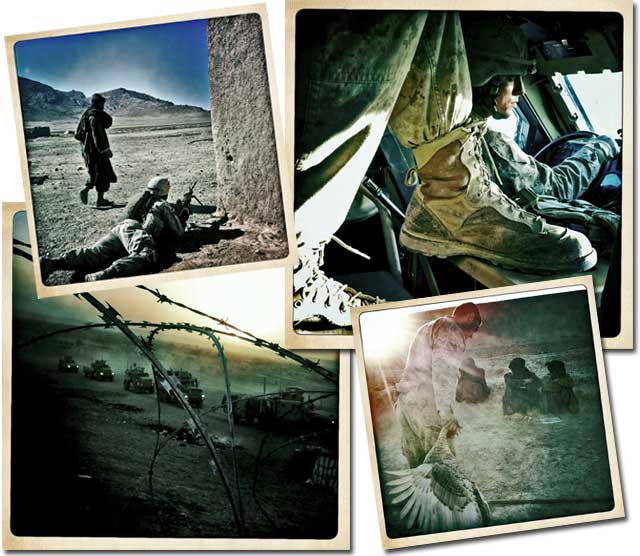
Social media reporting project from Afghanistan set to debut as multi-media performance
Photos by Teru Kuwayama
Basetrack, a social media reporting project that accompanied a marine battalion on a deployment in Afghanistan, will be adapted into a series of theater performance next week at Juilliard in New York. The multi-media performances will include projections of photos, videos, Facebook transcripts-as-dialogue, tweets and live performance. The project, a 2010 Knight News Challenge winner, built on its director Teru Kuwayama’s nine years of experience working as a freelance journalist in Afghanistan. Knight recently interviewed Kuwayama and Edward Bilous, the director of the new Center for Innovation in the Arts at Juilliard, to learn more about the story behind the performances and what viewers can expect. Knight Foundation: What’s the story behind how Basetrack was adapted for the upcoming theater performance? Edward Bilous: When I saw Teru’s work last year, I was so moved by not only the power of the story and images but by the newness of the experience. While journalism and art have always shared some common terrain – conveying, sharing and expressing human experiences – Teru’s work is somehow both journalism and art. I am fascinated by this concept. I believe Basetrack has opened the door for many other creative artists. What excited you about the opportunity to turn Basecamp into a multimedia performance? Teru Kuwayama: Basetrack, among other things, has been an experiment in moving ideas and information beyond their normal environments – breaking up the “filter bubbles”, so to speak. Specifically, with our work in Afghanistan, the goal is to disrupt the disconnect between the public and the longest war in U.S. history, and key to that is injecting our images and ideas in non-traditional ecosystems. The Basetrack team of embedded journalists was composed of photographers whose work traditionally appeared in news magazines, so my interest was taking it everywhere else. “Multimedia” per se, isn’t a new approach, but the injection of live performers, and taking it into the context and culture of Julliard is new ground, so I’m very interested in that aspect. EB: As founding director of the Music Technology Center at Juilliard and creative director of Beyond the Machine festival, I am always looking to expand the artistic and creative opportunities for Juilliard students. Basetrack provided us with a substantive work that would allow students, alumni and faculty from both the Music and Drama Divisions to come together in the creation and performance of an exciting multimedia work. What can viewers expect from each of the four performances? Will they each be different? EB: The content of the work will be the same all four evenings, however there will be some variation from one performance to the next due to some randomization of the way materials are presented. Electronic musicians will be triggering a gallery of images and sounds from Afghanistan in an improvisational manner. Also, we will be getting live Twitter feeds from Kabul that will differ from night to night. Can you give us a sneak peak as to how the performances will integrate photos, video, audio, tweets, etc. with the live musicians and actors? EB: This is actually very difficult to do. The show is technically very complex and involves a host of programmers, technicians and artists. Where can people go to find out more about the performances and get tickets? EB: The performances will take place March 29, 30, 31 and April 1 at 8 p.m. at the Rosemary and Meredith Willson Theater at The Juilliard School. The performances are free, but reservations are required. For more information, visit musictech.juilliard.edu or call 212.769.7406. A very limited number of reservations will be taken via email at [email protected].
To view more images from Basetrack, view this photo-essay, which originally appeared in Foreign Policy magazine.
Recent Content
-
Journalismarticle ·
-
Journalismarticle ·
-
Journalismarticle ·


